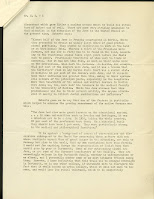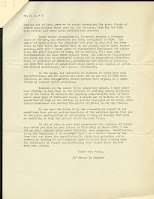 A legendary figure at the College, Ernest Martin Hopkins served as Dartmouth’s president from 1916 to 1945. Although he had hoped to gracefully turn the helm over to his successor once the Second World War ended, the run-up to Hopkins’ retirement in October 1945 proved to be anything but graceful.
A legendary figure at the College, Ernest Martin Hopkins served as Dartmouth’s president from 1916 to 1945. Although he had hoped to gracefully turn the helm over to his successor once the Second World War ended, the run-up to Hopkins’ retirement in October 1945 proved to be anything but graceful.On February 10 of that year, Hopkins was one of 300 educators to receive a telegram from the Independent Citizens Committee of the Arts, Sciences and Professions decrying a potential hard quota on Jewish applicants to New York medical schools. The cable asked the educators to join with the Committee in condemning the restriction of any religious or racial group’s enrollment in schools. In a response sent that same day, Hopkins declined the Committee’s request, stating:
Understand complexity of problem and am sympathetic with purposes you have in mind. Cannot join with you however if your protest is against proportionate selection for I believe nothing would so increase intolerance and focus racial and religious prejudice as to allow any racial group to gain virtual monopoly of educational advantages offered by any institution of higher education.
While Hopkins doubtless considered the matter closed, Herman Shumlin, a Director of the Committee, was substantially upset by the president’s reply. On March 26, Shumlin, who was Jewish, sent a letter declaring his refusal to purchase a subscription to Americans United for World Organization, an internationalist organization that Hopkins chaired. Shumlin wrote to the organization’s Executive Vice President, Ulric Bell, that he failed to see how “such an organization can do good when the Chairman … is, himself, a prejudiced man,” citing Hopkins’ declination to condemn quotas. Bell forwarded this letter to Hopkins.
A vociferous writer of letters and an uncommonly outspoken and assertive man, the 67-year-old Hopkins then took it upon himself on April 2 to write to Shumlin, unprompted, to elaborate upon and explain his position. Hopkins’ letter went unacknowledged for nearly two months, until, on June 2, Shumlin made his reply, in which he assailed Hopkins’ proffered explanations and justifications. He wrote: “I am filled with anger against you and shame…” By August 7, Shumlin had turned his correspondence with Hopkins over to the press, for on that day the New York Post and on the next day PM (another NYC-based newspaper) ran articles which blasted Hopkins’ letter to Shumlin as bespeaking clear anti-Semitism in Dartmouth’s admissions. Thus began a maelstrom in the national news for the next several weeks. Hopkins’ letter to Shumlin instantly received wide exposure—even as the first atomic bomb had been dropped only a day earlier and the second was to follow on August 9.Hopkins’ letter to Shumlin undoubtedly read then, as it does now, as a troubling and often quite startling consideration of its subject matter. Incredibly, it seeks to justify Dartmouth’s anti-Semitic quota as a means of preventing anti-Semitism! Writes Hopkins: “I should not be willing to see the proportion of the Jews in the College so greatly increased as to arouse widespread resentment and develop widespread prejudice within our own family.”
By August 7, Shumlin had turned his correspondence with Hopkins over to the press, for on that day the New York Post and on the next day PM (another NYC-based newspaper) ran articles which blasted Hopkins’ letter to Shumlin as bespeaking clear anti-Semitism in Dartmouth’s admissions. Thus began a maelstrom in the national news for the next several weeks. Hopkins’ letter to Shumlin instantly received wide exposure—even as the first atomic bomb had been dropped only a day earlier and the second was to follow on August 9.Hopkins’ letter to Shumlin undoubtedly read then, as it does now, as a troubling and often quite startling consideration of its subject matter. Incredibly, it seeks to justify Dartmouth’s anti-Semitic quota as a means of preventing anti-Semitism! Writes Hopkins: “I should not be willing to see the proportion of the Jews in the College so greatly increased as to arouse widespread resentment and develop widespread prejudice within our own family.”Hopkins cautions Shumlin that, in Germany after the First World War, there was a dramatic increase of anti-Semitism due to “the soldiers finding all their institutions and all of their professions dominated by a race [the Jews] which numbered only one per cent of the population.” To prove this, Hopkins cites (fallacious) statistics given by Australian sociologist Stephen Roberts in his book The House That Hitler Built (1938).
As PM was quick to point out, German institutions were not, in fact, dominated by Jews “in 1919 or 1933 or any other time. Hopkins got his figures from Roberts. Roberts got his figures from an article by Alfred Rosenberg in the Voelkischer Beobachter for Aug. 20, 1933. One would think that the president of an American college would be a little embarrassed about spouting the Hitler-Rosenberg line … that anti-Semitism is the fault of the Jews.” Shumlin had earlier observed the same in his reply to Hopkins: “It is fantastic to me that a man in your position can, at this date, make use of the very allegations which were used by Hitler and his accomplices.” To be sure, Hopkins argues in his letter that, in their “aggressiveness,” those Jews advocating increased Jewish admittances to schools “are raising anti-Jewish prejudice to a level that it has never before reached in this country.”The New Republic highlighted as well the important detail that Hopkins “appears to assume, flying in the face of all anthropological science, that the Jews are a race.” Hopkins’ suggestion that admitting more Jewish students would make Dartmouth an “urban college” also has racial undertones. Of course, it was the Nazis who suggested that Jews were a separate and inferior “race,” and hence Hopkins’ phrasing may be said to echo the idea of racial anti-Semitism.
It was not until President Hopkins’ retirement was announced on August 30 that the media onslaught began to subside (the War, it should be noted, ended three days later, dominating coverage). However, Dartmouth, President Hopkins, and his ultimate successor President Dickey continued to receive a voluminous quantity of letters from concerned alumni and other parties regarding Dartmouth’s admissions procedures. In personal replies, Hopkins backtracked from his subscription to the Roberts book’s statistics but cited them as “commonly accepted” and thus dangerous even if inaccurate. He also continued to deny that Dartmouth’s practices amounted to the imposition of a “quota.”
To see some of Hopkins' correspondence about the Jewish quota, ask for the two "Criticism" folders in DP-11, box 6073; the two "Criticisms" folders in DP-12, box 7094; and MS-1359, box 4, folder 38 ("Jewish Controversy").
Posted for Matt Skrod ’24, recipient of a Historical Accountability Student Research Fellowship
for the 2023 Spring term. The Historical Accountability Student
Research Program provides funding for Dartmouth students to conduct
research with primary sources on a topic related to issues of
inclusivity and diversity in the college's past. For more information,
visit the program's website.